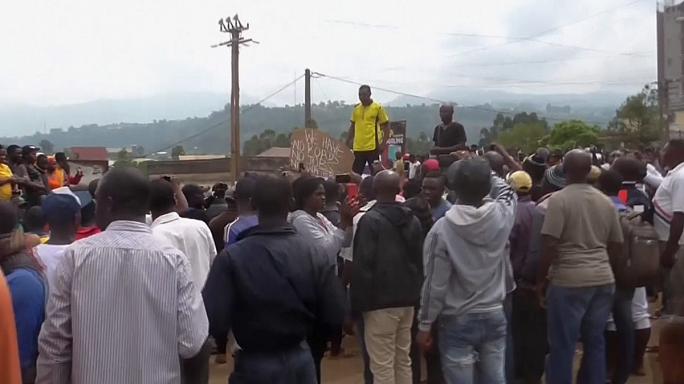At least eight people were killed during protests in towns across western Cameroon on Sunday as residents of the mainly English-speaking regions defied a ban on public gatherings and demanded independence from the rest of the largely Francophone nation.
The protests in the Southwest and Northwest regions have been called by a group known as Southern Cameroon/Ambazonia Governing Council. Four demonstrators were shot dead in the northwestern town of Kumbo as they marched to government buildings to hoist the blue and white Ambazonia flag, Mayor Donatus Njong Fonyuy said by phone.
Another three bodies were taken to the mortuary in southwestern Buea, while a person with gunshot wounds was declared dead at the Kumba Presbyterian Clinic in the same region, Mercy Ndum, a nurse at the facility, said by phone.
Activists hoisted the Ambazonia flag in Bamenda in the northwest, Emile Gousmou, the territory’s head of police, said by phone. Protesters in Buea were heading toward government offices in the afternoon as crowds of mainly young people waved green branches and chanted an independence anthem.
Internet Curtailed
Earlier on Sunday, helicopters were flying at low range in Buea, with a large number of troops posted around government offices, schools and churches. The government also curtailed internet services.
President Paul Biya, 84, ordered a wave of arrests earlier this year after lawyers and teachers in English-speaking areas protested the dominance of the French language in courts and schools throughout the Northwest and Southwest regions, which border Nigeria.
“Nothing great can be achieved using verbal excesses, street violence, and defying authority,” Biya said on his Facebook account on Sunday. “Lasting solutions to problems can be found only through peaceful dialogue.”
Authorities were ready to crack down on protesters who ignored a directive which banned meetings of more than four people and prohibited inter-city travel during the weekend, government spokesman Issa Tchiroma Bakary said on Saturday.
Cameroon, originally colonized by Germany, was split after World War One into a bigger French-run zone and smaller British-controlled area. They were unified in 1961. The country is a key transit hub for landlocked neighbors Central African Republic and Chad, and exports crude oil, timber, cocoa and palm oil.
In a statement last week, United Nations Secretary-General Antonio Guterres urged all parties to the dispute to refrain from actions that could heighten tensions and said authorities should promote national reconciliation by finding a solution to the crisis.


